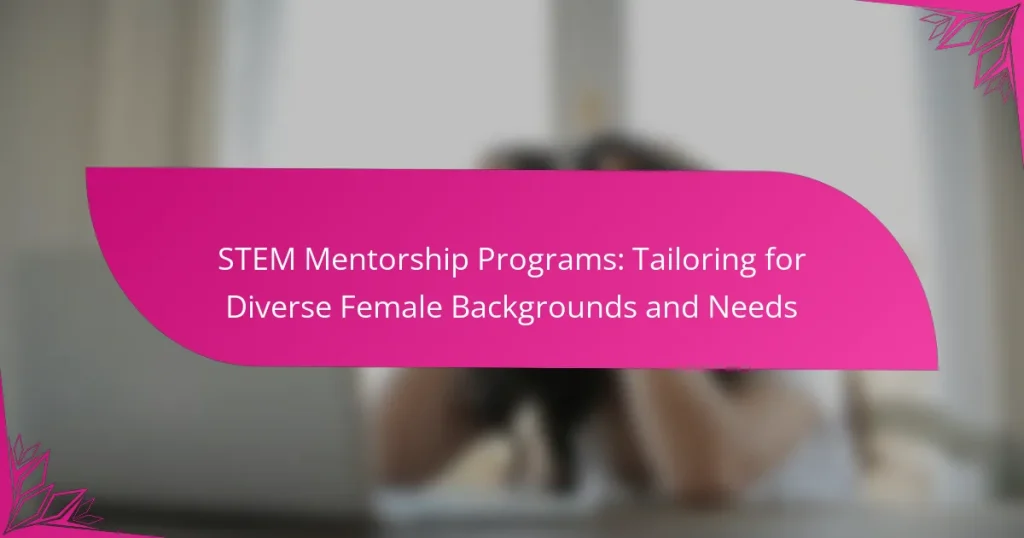STEM mentorship programs play a crucial role in supporting women from diverse backgrounds by fostering inclusive environments that address their unique challenges. By tailoring mentorship approaches to individual needs and promoting community engagement, these programs enhance career outcomes and create pathways for success in STEM fields.
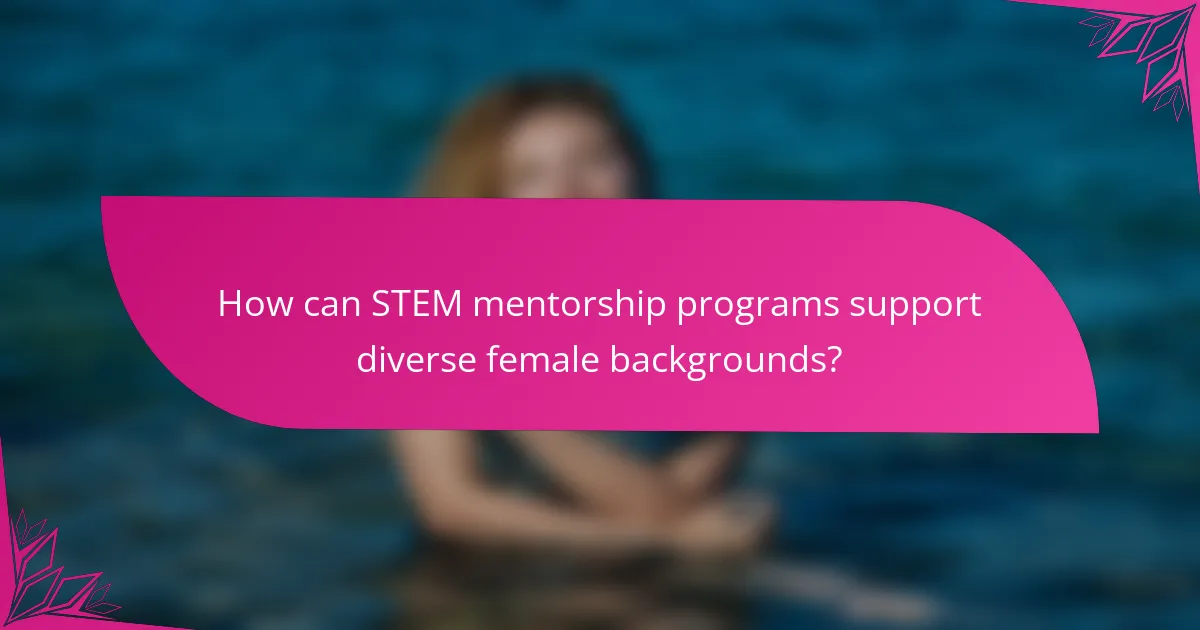
How can STEM mentorship programs support diverse female backgrounds?
STEM mentorship programs can effectively support diverse female backgrounds by creating inclusive environments that recognize and address the unique challenges faced by women from various cultural, socioeconomic, and educational backgrounds. Tailoring mentorship approaches to individual needs and fostering community engagement are essential components of these programs.
Inclusive program structures
Inclusive program structures are designed to accommodate the diverse needs of female participants. This can include flexible scheduling to allow for varying commitments, such as family or work responsibilities, and offering programs in multiple languages to ensure accessibility for non-native speakers.
Additionally, creating a welcoming atmosphere that celebrates diversity can enhance participation. This may involve training mentors on cultural competency and ensuring representation of diverse backgrounds among program leaders and mentors.
Tailored mentorship approaches
Tailored mentorship approaches focus on the individual needs and goals of each participant. This can involve one-on-one mentorship sessions that align with the mentee’s career aspirations, educational background, and personal challenges. For example, a mentee interested in engineering might benefit from a mentor with experience in that specific field.
Programs can also implement tiered mentorship levels, allowing participants to choose mentors based on their current stage in education or career. Providing resources such as workshops on resume building or interview preparation can further support tailored mentorship.
Community engagement initiatives
Community engagement initiatives play a crucial role in connecting diverse female participants with local resources and networks. Collaborating with schools, universities, and local businesses can create pathways for internships and job opportunities, enhancing the practical impact of mentorship programs.
Organizing community events, such as STEM fairs or networking nights, can foster relationships among participants and mentors. These initiatives not only build confidence but also create a supportive network that encourages ongoing participation and growth in STEM fields.

What are effective strategies for recruiting mentors?
Effective strategies for recruiting mentors include building strong partnerships, leveraging social media, and organizing networking events. Each approach can enhance visibility and attract diverse mentors who are committed to supporting female mentees in STEM fields.
Partnerships with educational institutions
Collaborating with educational institutions can significantly broaden the pool of potential mentors. Schools, colleges, and universities often have access to professionals who are eager to share their knowledge and experiences with students.
Consider establishing formal agreements with local universities or community colleges to create structured mentorship programs. These partnerships can facilitate workshops, guest lectures, and internships, providing mentors with a platform to engage with students directly.
Utilizing social media platforms
Social media is a powerful tool for reaching potential mentors, especially among younger demographics. Platforms like LinkedIn, Twitter, and Facebook can be used to share mentorship opportunities and success stories, attracting individuals who resonate with the mission.
To maximize effectiveness, create targeted campaigns that highlight the benefits of mentorship, such as professional growth and community impact. Engaging content, such as videos or testimonials, can also encourage participation.
Networking events and workshops
Hosting networking events and workshops can create a dynamic environment for connecting mentors and mentees. These gatherings allow for face-to-face interactions, fostering relationships that may lead to mentorship opportunities.
When organizing events, focus on creating inclusive spaces that cater to diverse backgrounds. Incorporate activities that encourage dialogue and collaboration, ensuring that all participants feel valued and engaged. Consider offering refreshments or incentives to enhance attendance and participation.
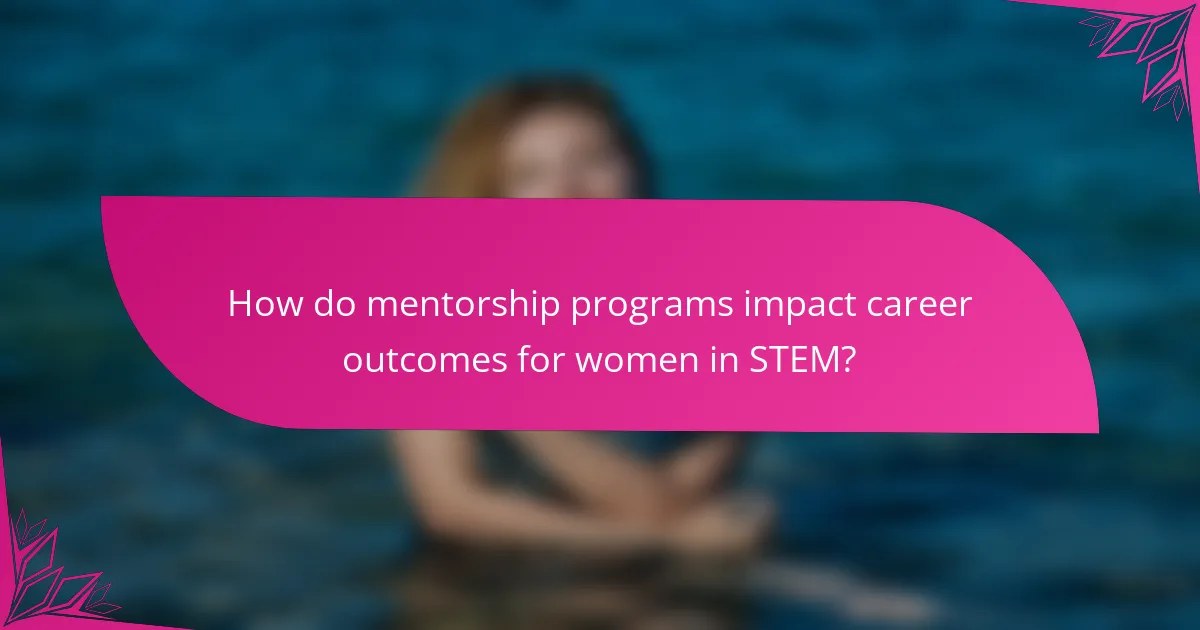
How do mentorship programs impact career outcomes for women in STEM?
Mentorship programs significantly enhance career outcomes for women in STEM by providing guidance, networking opportunities, and support tailored to their unique challenges. These programs can lead to improved job placements, increased retention rates, and better professional development, ultimately fostering a more inclusive environment in STEM fields.
Increased job placement rates
Mentorship programs often connect women with industry professionals who can provide insights into job opportunities and hiring practices. This guidance helps mentees navigate the job market more effectively, leading to higher placement rates compared to those without mentorship.
For example, women who participate in structured mentorship initiatives may find job offers that align with their skills and interests, often within a few months of program completion. This targeted support can be crucial in competitive fields where networking plays a vital role.
Higher retention in STEM fields
Retention rates for women in STEM fields improve significantly through mentorship, as ongoing support helps them overcome workplace challenges. Mentors can offer advice on navigating workplace dynamics and provide encouragement during difficult times, which is essential for long-term career satisfaction.
Research suggests that women with mentors are more likely to stay in their positions for longer periods, reducing turnover and fostering a more diverse workforce. This stability benefits organizations by retaining talent and maintaining a diverse range of perspectives in problem-solving.
Enhanced professional development
Mentorship programs facilitate enhanced professional development by offering tailored guidance on skills and career advancement. Mentors can help women identify their strengths, set career goals, and develop the necessary skills to achieve them.
Additionally, these programs often include workshops, networking events, and access to resources that further support professional growth. Women who actively engage in mentorship are more likely to pursue leadership roles and participate in continuous learning opportunities, which are critical for career advancement in STEM.

What criteria should be considered when selecting a mentorship program?
When selecting a mentorship program, it’s essential to consider how well the program aligns with your career aspirations, its commitment to diversity and inclusion, and the qualifications of the mentors involved. These criteria ensure that the mentorship experience is both relevant and supportive of your unique background and needs.
Program alignment with career goals
Choosing a mentorship program that aligns with your career goals is crucial for maximizing its benefits. Look for programs that offer specialized tracks or focus areas that match your interests, whether in engineering, technology, or other STEM fields. For example, if you aim to work in renewable energy, seek programs that emphasize sustainability and innovation.
Additionally, consider the program’s structure. Some may offer one-on-one mentorship, while others provide group settings or workshops. Assess which format best supports your learning style and professional development needs.
Diversity and inclusion policies
Effective mentorship programs should prioritize diversity and inclusion, creating an environment where all participants feel valued and supported. Review the program’s policies to ensure they actively promote representation across various demographics, including race, ethnicity, and socioeconomic background.
Programs that incorporate diverse perspectives often lead to richer discussions and more innovative solutions. Look for initiatives that provide training on cultural competency and actively seek to address barriers faced by underrepresented groups in STEM.
Mentor qualifications and experience
The qualifications and experience of mentors play a significant role in the effectiveness of a mentorship program. Ideal mentors should have relevant industry experience and a track record of supporting diverse mentees. Check if they have participated in similar programs or have received training in mentorship practices.
Consider the mentor’s availability and willingness to engage. A good mentor should be approachable and committed to providing guidance tailored to your specific challenges and aspirations. Look for testimonials or reviews from previous mentees to gauge their effectiveness and support style.
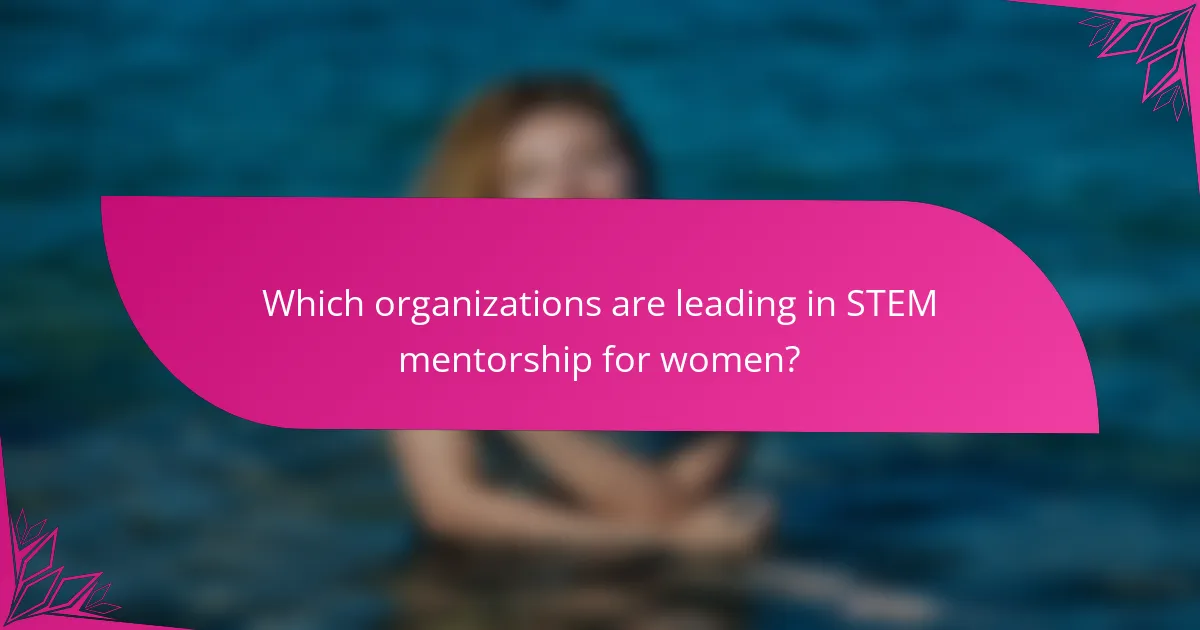
Which organizations are leading in STEM mentorship for women?
Several organizations are at the forefront of providing mentorship in STEM fields specifically for women. These groups focus on empowering young women through education, networking, and skill development tailored to their unique backgrounds and needs.
Girls Who Code
Girls Who Code is dedicated to closing the gender gap in technology by providing girls with the skills and confidence to pursue careers in computer science. The organization offers free summer programs, after-school clubs, and online resources that focus on coding and programming.
Participants engage in hands-on projects, often collaborating with peers and industry professionals. This approach not only enhances technical skills but also fosters a supportive community that encourages girls to explore their interests in tech.
Society of Women Engineers
The Society of Women Engineers (SWE) is a national organization that promotes the advancement of women in engineering and technology. SWE provides resources such as mentoring programs, scholarships, and networking opportunities to help women succeed in these fields.
Members can access professional development workshops and conferences, which are vital for building connections and gaining insights from established engineers. SWE also advocates for policies that support women in engineering at various educational and professional levels.
National Girls Collaborative Project
The National Girls Collaborative Project (NGCP) aims to bring together organizations that are committed to encouraging girls to pursue STEM careers. By fostering collaboration among various groups, NGCP enhances the effectiveness of programs aimed at girls.
Through initiatives like the Girls STEM Summit, NGCP provides a platform for sharing best practices and resources. This collaboration helps ensure that girls from diverse backgrounds receive the mentorship and support they need to thrive in STEM fields.
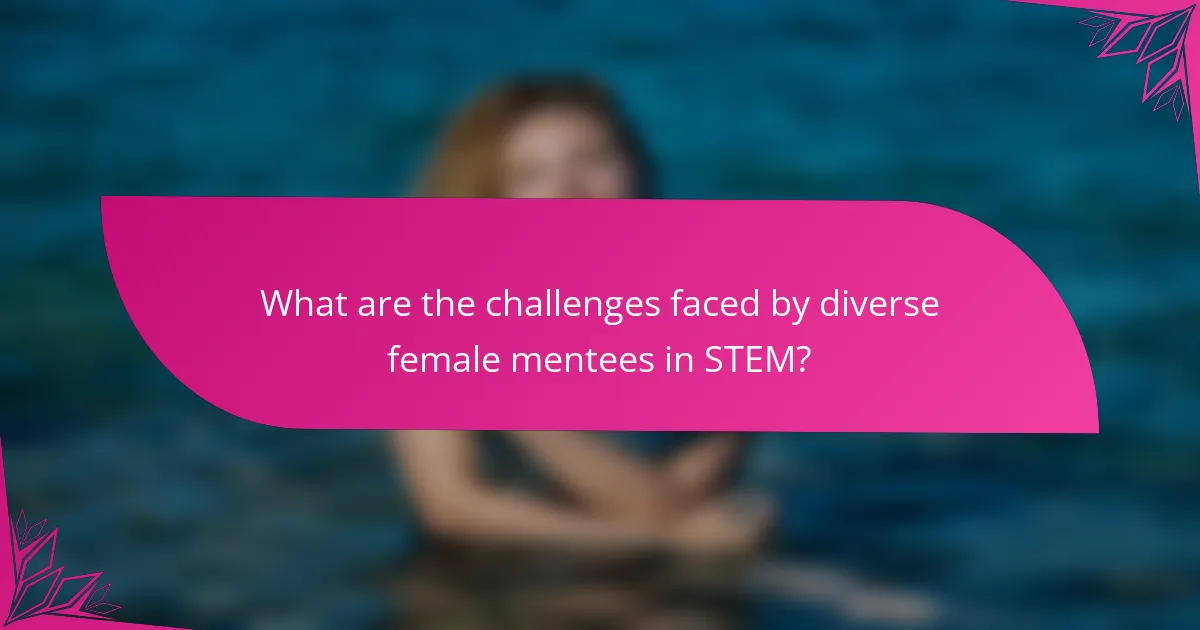
What are the challenges faced by diverse female mentees in STEM?
Diverse female mentees in STEM encounter several challenges that can hinder their progress and success in these fields. Key issues include limited access to resources and networks, the need to overcome stereotypes and biases, and the difficulty of balancing personal and professional commitments.
Access to resources and networks
Many diverse female mentees face barriers in accessing essential resources and professional networks that are crucial for career advancement in STEM. This can include a lack of mentorship opportunities, funding for education, and connections to industry professionals.
To improve access, programs should focus on creating inclusive networks that actively seek to connect diverse women with mentors and peers in their fields. Initiatives like workshops, networking events, and online platforms can facilitate these connections.
Overcoming stereotypes and biases
Diverse female mentees often confront stereotypes and biases that can undermine their confidence and limit their opportunities in STEM. These biases may manifest in the workplace or academic settings, leading to a lack of support and recognition.
Mentorship programs should emphasize awareness and training around these issues, equipping mentors and mentees with strategies to address and combat stereotypes. Encouraging open discussions about biases can help create a more supportive environment.
Balancing personal and professional commitments
Many diverse female mentees struggle to balance their personal responsibilities with the demands of a STEM career. This challenge can be particularly pronounced for those who may have caregiving responsibilities or other personal obligations.
To assist in this area, mentorship programs can offer flexible scheduling for meetings and provide resources for time management. Encouraging mentees to set clear boundaries and prioritize their commitments can also help them navigate these challenges effectively.
